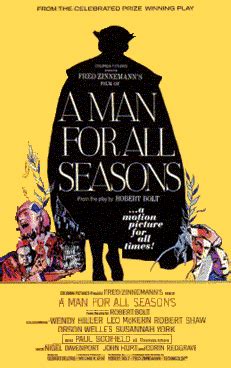A Man for All Seasons
directed by: Fred Zinnemann, year: 1966
actors: Paul Scofield, Wendy Hiller, Leo McKern, Robert Shaw, Orson Welles
actors: Paul Scofield, Wendy Hiller, Leo McKern, Robert Shaw, Orson Welles

Description:
A Man for All Seasons is a historical drama film depicting the final years of Sir Thomas More, the 16th-century Lord Chancellor of England who refused to endorse King Henry VIII's separation from the Catholic Church. The film explores themes of integrity, conscience, and the political and religious turmoil of the era. More's unwavering principles lead to a tragic confrontation with the king, showcasing a profound conflict between personal beliefs and political pressures.Keywords:
Drama, Historical, Religious Conflict, Integrity, 16th CenturyIs the movie A Man for All Seasons historically accurate?
"A Man for All Seasons," directed by Fred Zinnemann and based on Robert Bolt's play, presents a dramatized account of Sir Thomas More's stance against King Henry VIII's separation from the Catholic Church. While it captures the essence of More's moral integrity and the political tensions of the Tudor era, some details are simplified or fictionalized for dramatic effect. Characters and events are portrayed in a way that emphasizes moral themes rather than strict historical accuracy. Overall, it serves as a powerful exploration of conscience and integrity within a historical framework.
What is the best version of A Man for All Seasons?
The best-known version of "A Man for All Seasons" is the 1966 film directed by Fred Zinnemann, which stars Paul Scofield as Sir Thomas More. It received critical acclaim, winning six Academy Awards, including Best Picture and Best Actor for Scofield. The film is praised for its powerful performances, strong screenplay, and historical accuracy. While there are stage adaptations and television versions, the 1966 film remains the definitive version for its cinematic quality and depth in portraying More's moral struggle against King Henry VIII.
What is the famous line from A Man for All Seasons?
In "A Man for All Seasons," one of the most famous lines is spoken by Sir Thomas More: "I die the King's good servant, but God's first." This line encapsulates More's moral integrity and his commitment to his faith over political allegiance. The film, which portrays More's conflict with King Henry VIII over the annulment of his marriage and the establishment of the Church of England, emphasizes themes of conscience, loyalty, and the struggle between personal beliefs and authority.
How many Oscars did A Man for All Seasons win?
"A Man for All Seasons" won six Academy Awards at the 1967 Oscars. The film, directed by Fred Zinnemann, received Oscars for Best Picture, Best Director, Best Actor (Paul Scofield), Best Adapted Screenplay, Best Cinematography, and Best Costume Design. It is based on Robert Bolt's play about Sir Thomas More and his moral stand against King Henry VIII's separation from the Catholic Church. The film is celebrated for its powerful performances and historical significance.
Explore More Categories:
Rave Culture Desperation Materialism Change Victorian Insecurity Cat And Mouse Gangs Relationship Dynamics Psychological Breakdown Perfection Cosmic Horror Communication Food Ingenious Engineering Jungle Relationship Free Will Religious Drama Pandemic Female Friendship Inspiration Emotional Depth Slasher Emotions